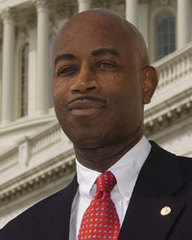While surfing cable channels during the fiscal-cliff clatter of New Year’s Eve afternoon, I couldn’t help but wonder about one news ticker in particular: “Senate Chaplain Prays for Fiscal Cliff Deal.” Did the chaplain believe that God has a position on whether there should be a deal before midnight January 1, as distinct from an agreement that would surely materialize some days or weeks after going off the cliff? And if the divine will were to cut so finely, how would he, who is not divine, know?
Then I looked up the story behind the ticker, which did more justice to the prayer offered up by Senate Chaplain Barry C. Black.
A former Navy chaplain and Seventh-Day Adventist minister, Black didn’t exactly go over the theological cliff by invoking God’s endorsement of the Biden-McConnell plan. The chaplain gazed at the edge. He asked God to “lift them”—lawmakers—“from the darkness and hopelessness” of those hours at the fiscal cliff. “May they take the tide that leads to fortune, rather than risk a national voyage bound in shadows and in miseries,” he intoned.
Other than perhaps the good reverend, whose prayers were answered by the deal struck before midnight and approved later by the Senate and House?
It’s in the nature of a political compromise that there’s no simple answer to that question. But among those who might be a bit relieved are the hard-working, low-earning Americans who receive so-called “refundables” at tax time. That’s a word you probably didn’t see in the news tickers.
This particular story goes back to the Bush tax cuts—which were not quite as lopsided as many liberals believe. While these packages delivered the greatest goodies to the rich, they also included expansions of the Earned Income Tax Credit for the working poor and the child tax credit. Both of those are refundable, meaning that the government will cut you a check if you qualify but don’t earn enough to pay federal income taxes. The Obama administration further expanded the refundable credits in 2009.
Set to expire at the start of 2013, the credits were tucked into the final cliff-averting agreement. That’s big, especially if you earn a small income.
The mother of all refundables, the Earned Income Tax Credit, can deliver a few thousand dollars a year to hard-pressed workers and their families. Kathy A. Saile, who handles domestic policy issues for the U.S. Conference on Catholic Bishops, recently gave me a view of this from down below the middle class. She previously served as a case manager at a homeless shelter in Phoenix, where many of the residents commuted to jobs, in some cases two or three of them. Saile told me in a telephone conversation in November that this credit alone often “made the difference between families staying in the shelter and getting on their feet” and into their own apartments.
Referring also to the refundable per-child credit, she noted: “The Church has always been a strong supporter of these tax credits, because they’re pro-work, and they’re pro-family, and they help get people out of poverty.”
True, but clambering out of poverty will also be a little harder for many people, in another respect. Cliff negotiators choose not to salvage the payroll tax cuts enacted during Obama’s first term, cuts that kept hundreds of dollars in the pockets of struggling workers. And that is one reason why the deal is a mixed blessing for those Americans who are always dangling precariously off the cliff. …read more







